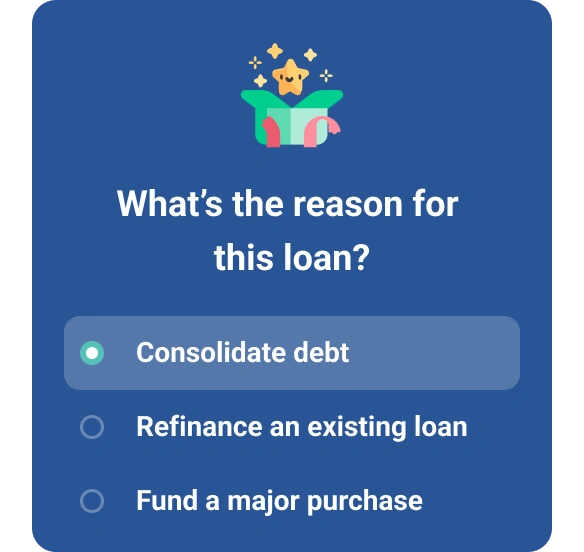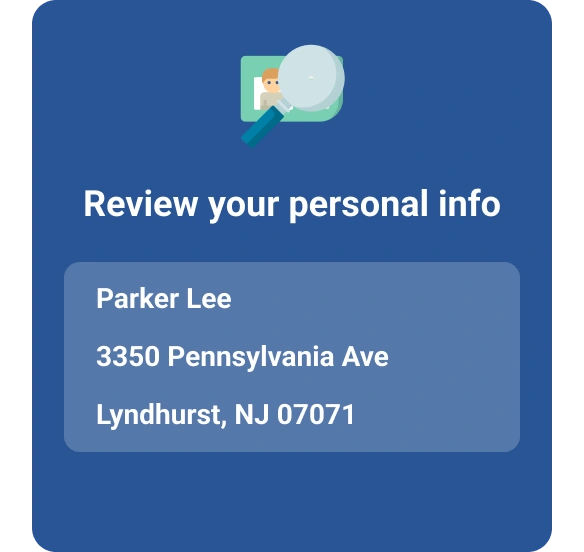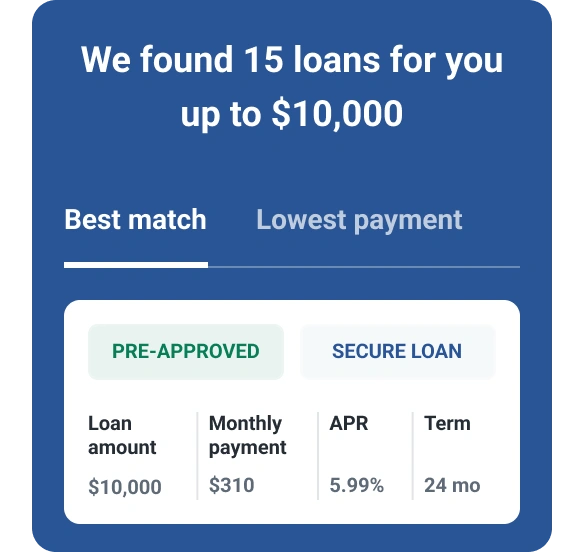What Is a Personal Loan?
Quick Answer
A personal loan offers a fixed interest rate, relatively quick funding and predictable payments. You can use personal loans for a wide range of goals, including consolidating high-interest debt. That said, they can also be an expensive way to borrow.

A personal loan is a type of loan that allows flexible borrowing, short- to moderate-term repayment options and relatively quick funding. Whether you're trying to consolidate high-interest debt, start a business or pay an expensive medical bill, a personal loan can help you accomplish your goal.
However, a personal loan can be expensive compared with other types of debt, and it may not be the best option for every situation. Here's what to consider before you apply.
How Do Personal Loans Work?
Personal loans, which may also be called debt consolidation loans or signature loans, can be used to fund a variety of goals. Personal loan features can vary depending on the lender, but here are some general guidelines to know as you research your options:
- Loan amount: Depending on the lender you choose, as well as personal factors, you may be able to borrow anywhere from a few hundred dollars to $100,000.
- Loan term: Personal loan repayment terms typically range from one to seven years. However, some lenders may offer longer terms for certain purposes. Some lenders may offer terms shorter than one year.
- APR: Personal loans typically offer fixed interest rates, which remain the same throughout the life of the loan. Most top lenders offer annual percentage rates (APRs) ranging from roughly 8% to 36%. However, some lenders may charge APRs that rise into the triple digits on loans intended for poor-credit borrowers.
- Fees: Some personal loan lenders charge an upfront origination fee, which can range from 1% to over 10% of the loan amount. However, there are some lenders that don't charge an origination fee. Other potential fees may include application fees, prepayment penalties, late or returned payment fees and payment processing fees.
- Credit score requirements: There's no universal minimum credit score requirement for personal loans, and some lenders specialize in working with bad-credit borrowers. However, you'll typically need a good credit score or better to qualify for the best terms.
- Collateral: In most cases, personal loans are unsecured, which means you don't need to put up collateral to get approved. There are, however, secured personal loans that require you to use a savings account or another asset as collateral in case you default.
- Funding: Once you're approved for a personal loan, you typically get access to the funds within a week. However, some online lenders can deposit the money into your bank account as soon as the same day.
What Can I Use a Personal Loan For?
With most lenders, you have a lot of leeway for how you can use your personal loan funds. Some of the more common personal loan uses include:
- Debt consolidation (especially high-interest credit card debt)
- Medical bills
- Emergency expenses
- Home repairs and renovations
- Wedding expenses
- Divorce costs
- Moving expenses
- Funeral costs
- Furniture and appliance purchases
- Small business expenses
You can also use a personal loan for things like vacations, holiday shopping and other nonessential spending. Be warned, however, that it's generally recommended to save up instead of borrowing money for discretionary expenses.
It's also important to keep in mind that some lenders may have restrictions on how you can use your money. Some may prohibit education-related expenses, for instance. Check with the lender beforehand to make sure you can use a personal loan for your intended purpose.
Learn more: Things Not to Use a Personal Loan For
Pros and Cons of a Personal Loan
| Pros | Cons |
|---|---|
| Fixed rates and repayment terms | Interest rates can be high |
| Flexible borrowing limits and uses | Many lenders charge upfront fees |
| Relatively quick funding | Could result in unnecessary debt |
When Is a Personal Loan a Good Idea?
While it's possible to use a personal loan for just about anything, that doesn't mean it's always wise to do so. In general, it's a good idea to use a personal loan when it can improve your financial situation or provide necessary funds. Examples include:
- Debt consolidation: If you have high-interest credit card debt, you may be able to save money by paying it off with a lower-interest personal loan. Even if you don't necessarily save money on interest, a personal loan can provide a structured repayment term, which can help if you're struggling to stay motivated to pay more than your minimum payment.
- Home renovations: If you want to make improvements to your home, a personal loan may be a better choice than a home equity loan or line of credit because it doesn't come with the threat of losing your home if you default. Additionally, many renovations can increase the value of your home, mitigating some of the costs of the debt.
- Emergency expenses: In an ideal world, you'd have enough money set aside for emergencies. But that's not always the case. If you lose your job, your car breaks down or a major home appliance needs to be repaired or replaced, a personal loan can provide some peace of mind at a stressful time.
- Personal events: Weddings, divorces and funerals can be expensive, and it's not always possible to save up for such a major life event. In these instances, a personal loan can provide much-needed funds at the right time.
Learn more: Personal Loan Do's and Don'ts
How to Compare Personal Loans
Just as with any other financial product, it's important to shop around and compare several personal loan options before applying for one. Even if you get an appealing offer from your current bank or credit union, it's possible you could find a better deal elsewhere.
Here are the different features to consider while you're comparing personal loans:
- Interest rate: A loan's interest rate represents the cost of borrowing money. Personal loans have fixed interest rates, so you'll be charged the same amount of interest during the entire loan term.
- Loan term: Different lenders offer varying repayment terms, and how long you have to repay a debt impacts your monthly payment. If one offers you five years to repay a debt and another offers only three years, your monthly payment could be significantly higher with the second option. However, you might also save on interest with the shorter-term loan.
- Fees: In addition to interest, some lenders charge fees that could increase your APR. Origination fees, for instance, are deducted from your loan funds before you receive them, and some lenders also charge late fees and even prepayment fees if you pay off your loan early.
- Funding time: Some lenders offer next-day or even same-day funding, while others can take several days to deposit the funds into your checking account. Depending on how soon you need the money, consider these timelines.
- Other features: Not all lenders provide added features, but some may allow you to get a lower interest rate if you set up automatic payments or have an existing relationship with the bank. Others may offer forbearance options if you lose your job.
Many personal lenders allow you to get prequalified with a rate offer before you submit an application. This process typically requires a soft credit check, which won't impact your credit score, and can allow you to compare loan options side by side and pick the best fit for you.
Example: Let's say you want to borrow $15,000 to consolidate credit card debt, and you get quotes from three lenders. Using a personal loan calculator, here's what each might look like:
| Interest Rate | Repayment Term | Monthly Payment | Total Interest | |
|---|---|---|---|---|
| Loan 1 | 8% | 5 years | $304.15 | $3,248.75 |
| Loan 2 | 12% | 3 years | $498.21 | $2,935.73 |
| Loan 3 | 16% | 2 years | $734.45 | $2,626.72 |
How to Qualify for a Personal Loan
Personal loans are available for most consumers across the credit spectrum, but there are some things you can do to improve your chances of getting approved at a favorable rate. Here are some factors lenders consider when you apply:
- Credit score: Many top lenders may require fair or good credit to get approved. However, there are personal loans for bad credit, so you're not completely out of luck if you don't have time to improve your credit before you apply.
- Credit report: While your credit score is important, it doesn't tell the whole story. Lenders will also check your credit report to make sure there aren't any red flags, such as delinquent payments, collection accounts, bankruptcy or foreclosure.
- Income: In addition to your annual income, lenders will also consider your debt-to-income ratio (DTI), which is the percentage of your gross monthly income that goes toward debt payments. You may have a hard time getting approved if your DTI is above 50%.
If your credit and income situation isn't where you want it to be for a personal loan, work to improve it before you apply.
How to Get a Personal Loan
If you've determined that a personal loan is right for you, here's how to find the right one for you:
- Check your credit score. Get access to your FICO® ScoreΘ for free for free with Experian to get an idea of where you stand and your approval odds for favorable terms.
- Determine how much you need. Carefully consider your financial needs to ensure that you don't apply for too much or too little.
- Get prequalified. Go through the prequalification process with at least three to five lenders and compare them side by side to determine where you can get the best offer. This will also give you an estimated monthly payment to help you decide if you can afford the loan.
- Submit an application. Once you've chosen a lender, you can typically apply through its website. You'll need to provide some basic information about yourself, your desired loan amount and your reason for borrowing. If you're applying with a cosigner or joint applicant, you'll also need to provide their information.
- Review the loan terms. If the lender approves your application, carefully review the final offer and loan agreement before you sign. Once you complete the process, you'll receive the loan funds based on the lender's timeline.
Frequently Asked Questions
Do Your Homework Before Applying
A personal loan can help you cover necessary expenses and improve your debt situation. But it's important to consider both the benefits and drawbacks before you apply. It's also essential that you take the time to shop around and compare different options before applying for one.
As you research lenders, Experian can help by providing loan offers from multiple partner lenders based on your credit profile. Experian shows you loans you're likely to qualify for in one convenient place. That can help you save time as you research and narrow down your list of potential lenders.
Need a personal loan?
Whether you're looking to eliminate debt or access cash fast, compare personal loan offers matched to your credit profile.
Start now for freeAbout the author
Ben Luthi has worked in financial planning, banking and auto finance, and writes about all aspects of money. His work has appeared in Time, Success, USA Today, Credit Karma, NerdWallet, Wirecutter and more.
Read more from Ben

